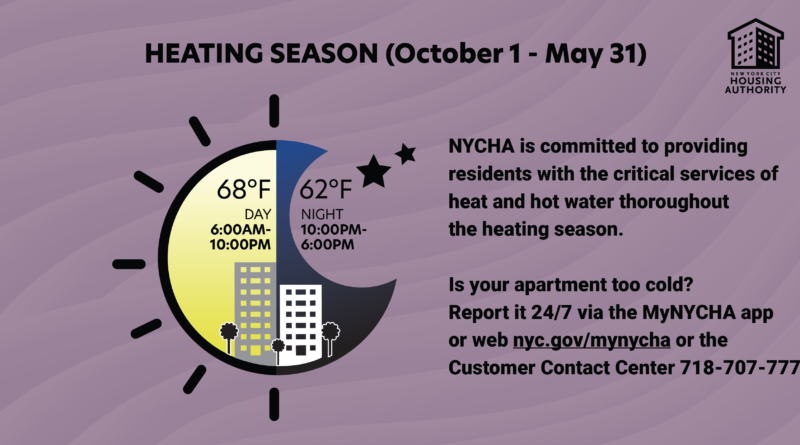It’s Heating Season
Saturday, October 1 marks the official start of the winter heating season, the citywide period through May 31 in which New York City building owners must maintain an indoor temperature of at least 68 degrees between 6 a.m. and 10 p.m. when it’s below 55 degrees outside; from 10 p.m. to 6 a.m., indoor temperature must be at least 62 degrees regardless of the temperature outside. Hot water must be kept at a minimum temperature of 120 degrees at the source, year-round. NYCHA remains committed to providing residents with the critical services of heat and hot water throughout the heating season – and has been performing annual overhaul inspections (4,597 heating assets and 1,279 boilers since early February).
To prepare for each heating season, NYCHA’s Heating Management Services Department (HMSD) conducts annual preventive maintenance to preserve and restore equipment reliability. This entails cleaning, lubricating, adjusting, repairing, and replacing worn components; ensuring equipment and mechanical areas are in satisfactory operating condition and making sure equipment is up to the latest City and State standards. In preparation for the 2022-23 heating season, NYCHA’s heating team and vendors performed annual preventative maintenance and made repairs, where applicable, to 99 percent of all heating equipment (compared to 92.5 percent prior to the 2021-2022 heating season). A third-party vendor has also been procured to help conduct preventive maintenance on 1,279 boilers, allowing HMSD staff to focus on distribution and repairs.
Each year, the Authority also develops a list of critical heat and hot water equipment and systems needing replacement or extensive repair. Ahead of the 2022-23 heating season, the Authority completed more than $7.8 million in operational investments across three different areas, including distribution, equipment replacements, and boiler plant upgrades. For the 2021-22 heating season, the Authority completed approximately $21.4 million in heating infrastructure investments; during the 2019-20 heating season, the Authority completed approximately $14.1 million in heating infrastructure improvements.
The Authority is also increasing staffing coverage ahead of the winter heating season, assigning 25 roving skilled trades teams to deploy in response to outages and adding four electrical teams, two plumber supervisors, and one electrical supervisor. Additionally, this heating season the Authority is hiring an additional 70 maintenance workers and additional field supervisors to support the reorganization of the department into a neighborhood-based model. The Heating Neighborhood Model will reorganize developments from the current 13 clusters into 25 neighborhoods, enabling each heat supervisor and administrator to fully understand the needs of each heat and hot water system within their neighborhood. Neighborhoods will be led by a heat supervisor who will report up to a heating neighborhood administrator (who will in turn report up to three field operation deputies and ultimately to the senior director). The Neighborhood Model will serve to move crucial decision-making that needs to happen in the midst of an outage closer to the point of delivery. Additional benefits include giving NYCHA’s heating staff a deeper understanding of a particular development’s needs and challenges; better distribution of work orders and resources; and closer collaboration between residents, NYCHA staff, and community organizations. In addition, this new staffing model will also add additional managerial staff to the evening Heat Desk operations, providing an efficient level of decision-making for issues that arise after traditional business hours and during weekends and holidays.
Additionally, NYCHA has a reserve of staged and non-staged mobile boilers that can be activated in the event of a heating outage. There are currently 23 mobile boilers connected to developments and nine mobile boilers that can be accessed if needed. The average age of NYCHA’s boilers is 26 years old, just over the 20–25-year average expected useful life of a boiler – making the work of boiler overhauls and preventative inspections critical to our heating season operations.
NYCHA has modernized heating controls at 48 developments and is in the process of completing that work at an additional 12 developments. Apartments that used to be typically overheated are now at a more comfortable range of 72-74 degrees during the day and 69-71 degrees at night, with the heat coming on in cycles to prevent overheating and underheating and to save energy costs. Residents at these buildings will no longer need to open their windows to let out excess heat. Residents experiencing issues with heat or hot water should call the Customer Contact Center at 718-707-7771 or report the issue via the MyNYCHA mobile app or web version.

